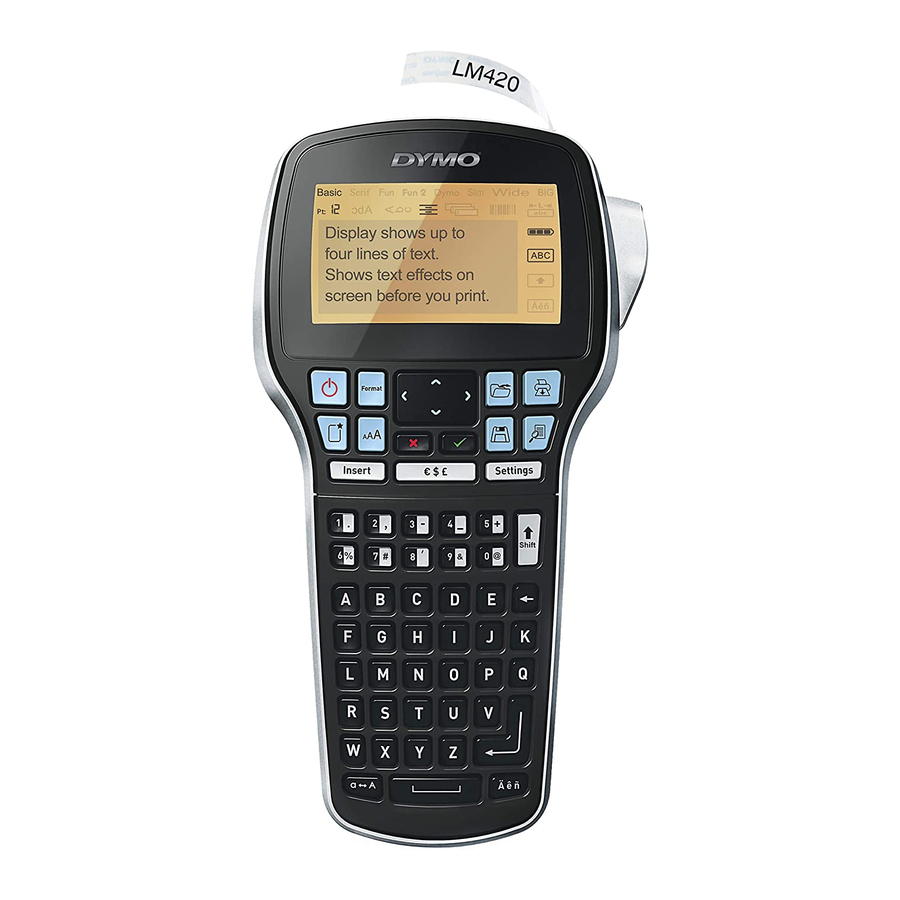
Dymo LabelManager 420P - Label Maker Manual
- Quick start manual (15 pages) ,
- User manual (12 pages) ,
- Overview (12 pages)
Advertisement
- 1 Overview
- 2 About Your New Label Maker
- 3 Getting Started
- 4 Using the Label Maker for the First Time
- 5 Getting to Know the Label Maker
- 6 Formatting Your Label
- 7 Using Clip Art, Symbols, and Special Characters
- 8 Using the Date/Time Stamp
- 9 Using Auto-Numbering
- 10 Using Barcodes
- 11 Using the Label Maker Memory
- 12 Caring for Your Label Maker
- 13 Using Your Label Maker with Your Computer
- 14 Troubleshooting
- 15 Documentation Feedback
- 16 Environmental Information
- 17 Documents / Resources

Overview
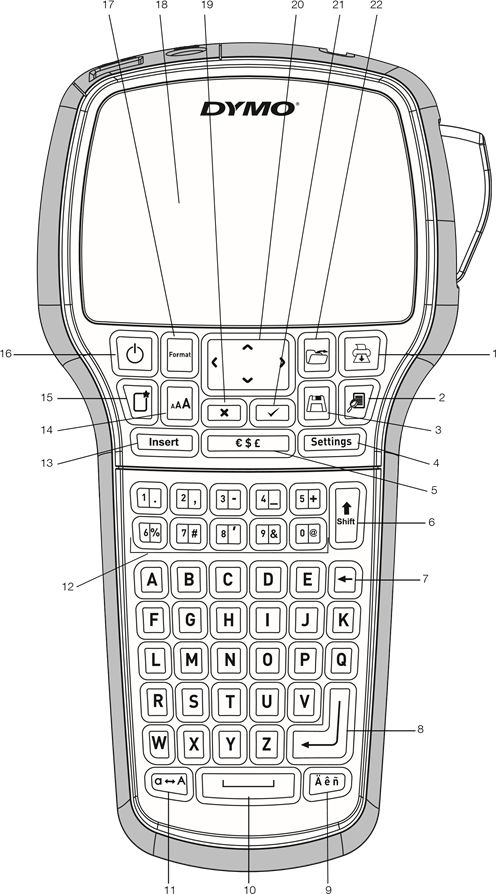
Figure 1DYMO LabelManager 420P label maker
- Preview
- Save
- Settings
- Symbols
- Shift
- Backspace
- Return
- Accented characters
- Space bar
- Caps
- Numeric keys
- Insert
- Font Size
- New label/Clear
- On/Off
- Format
- LCD display
- Cancel
- Navigation
- OK
- Open
About Your New Label Maker
With the DYMO® LabelManager 420P electronic label maker, you can create a wide variety of high-quality, selfadhesive labels. You can choose to print your labels in many different fonts, font sizes, and styles. The label maker uses DYMO D1 label cassettes in widths of 1/4" (6 mm), 3/8" (9 mm), 1/2" (12 mm), or 3/4" (19 mm). These label cassettes are available in a wide range of colors.
Visit www.dymo.com for information on obtaining labels and accessories for your label maker.
Product Registration
Visit www.dymo.com/register to register your label maker online.
Getting Started
Follow the instructions in this section to print your first label.
Connecting the Power
The label maker is powered by a rechargeable, Lithiumion battery pack. To save power, the label maker automatically turns off after ten minutes of inactivity.
Inserting the Battery
The battery pack included with your label maker comes partially charged.
To insert the battery
- Slide the battery compartment cover away from the label maker. See Figure 2.
![Dymo - 420P - To insert the battery To insert the battery]()
- Insert the battery pack into the battery compartment.
- Replace the battery compartment cover.

Recharging the Battery
A charging adapter is included with your label maker for recharging the battery pack. Use only the charging adapter that came with the label maker.

To recharge the battery
- Plug the charging adapter into the power connector on the top of the label maker.
- Plug the other end of the charging adapter into a power outlet.
Inserting the Label Cassette
Your label maker uses DYMO D1 label cassettes. Visit www.dymo.com for information about purchasing additional label cassettes.
To insert the label cassette
- Lift the label cassette cover to open the label compartment. See Figure 3.
![Dymo - 420P - To insert the label cassette - Step 1 To insert the label cassette - Step 1]()
- Make sure the tape and ribbon are taut across the mouth of the cassette and that the tape passes between the label guides. See Figure 4. If necessary, turn the ribbon rewind spool clockwise to tighten the ribbon. Ribbon rewind spool Label guides
![Dymo - 420P - To insert the label cassette - Step 2 To insert the label cassette - Step 2]()
- Insert the cassette and press firmly until the cassette clicks into place. See Figure 5.
![Dymo - 420P - To insert the label cassette - Step 3 To insert the label cassette - Step 3]()
- Close the label cassette cover.
Using the Label Maker for the First Time
The first time you turn on the power, you are asked to select the language and label width. These selections remain set until you change them.
You can change these selections using the  key.
key.
To set up the label maker
- Press
![]() to turn on the power.
to turn on the power. - Select the language and press
![]() .
. - Select the width of the label cassette currently in the label maker and press
![]() .
.
You are now ready to print your first label.
To print a label
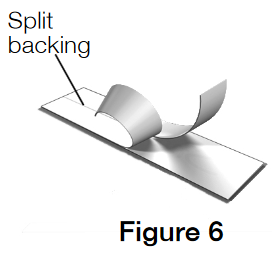
- Enter text to create a simple label.
- Press
![]() .
. - Press the cutter button to cut the label.
- Remove the paper backing from the label to expose the adhesive, and then attach the label.
Getting to Know the Label Maker
Become familiar with the location of the feature and function keys on your label maker. Refer to Figure 1. The following sections describe each feature in detail.
Power
The  button turns the power on and off. After ten minutes of inactivity, the power is switched off automatically. When the printer turns off, the last label created is remembered and displayed when the power is turned back on. The previously selected style settings are also restored.
button turns the power on and off. After ten minutes of inactivity, the power is switched off automatically. When the printer turns off, the last label created is remembered and displayed when the power is turned back on. The previously selected style settings are also restored.
LCD Display
The display can show four lines of text at a time. The number of characters displayed on each line will vary due to proportional spacing.
With DYMO's exclusive graphical display, most of the formatting you add is visible instantly.
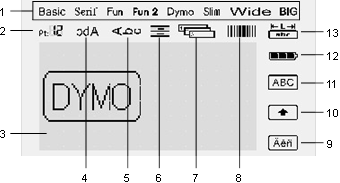
- Font
- Font size
- Edit area
- Mirror text
- Vertical text
- Text alignment
- Auto-numbering
- Barcode
- Accented character
- Shift
- Uppercase
- Battery
- Fixed label length
Feature indicators along the top and right of the LCD display appear black to let you know when a feature is selected.
Format
The  key displays the Font, Font Size, Style, Borders, Mirror, Vertical, Alignment, and Label Length submenus. These formatting features are described later in this User Guide.
key displays the Font, Font Size, Style, Borders, Mirror, Vertical, Alignment, and Label Length submenus. These formatting features are described later in this User Guide.
Font Size
The  key displays the Font Size menu. This formatting feature is described later in this User Guide.
key displays the Font Size menu. This formatting feature is described later in this User Guide.
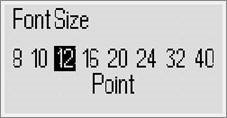
Insert
The  key allows you to insert symbols, clip art, barcodes, auto-numbering, the date and time, or saved text on your label. These features are described later in this User Guide.
key allows you to insert symbols, clip art, barcodes, auto-numbering, the date and time, or saved text on your label. These features are described later in this User Guide.
Settings
The  key displays the language, label width, and date/ time submenus.
key displays the language, label width, and date/ time submenus.
CAPS Mode
The  key toggles capitalization on or off. When Caps mode is on, the Uppercase indicator is shown on the display and all letters that you enter are capitalized. When Caps mode is off, all letters appear in lowercase. The default setting is Caps mode on.
key toggles capitalization on or off. When Caps mode is on, the Uppercase indicator is shown on the display and all letters that you enter are capitalized. When Caps mode is off, all letters appear in lowercase. The default setting is Caps mode on.
Shift
The ![]() key is used to select a symbol printed on a numeric key. For example, when you press
key is used to select a symbol printed on a numeric key. For example, when you press  , the number 8 appears in the display; however, if you press
, the number 8 appears in the display; however, if you press  and then
and then  , an apostrophe (') appears in the display.
, an apostrophe (') appears in the display.
You can also use the  key to toggle Caps mode on or off for a single alpha character.
key to toggle Caps mode on or off for a single alpha character.
Backspace
The  key removes the character to the left of the cursor. You can also use the
key removes the character to the left of the cursor. You can also use the  key to exit from a menu without making a selection.
key to exit from a menu without making a selection.
New Label/Clear
The  key gives you a choice to clear all label text, just the text formatting, or both.
key gives you a choice to clear all label text, just the text formatting, or both.
Navigation Keys
You can review and edit your label using the left, right, up and down navigation keys. You can also navigate through menu selections using the navigation keys, and then press  to make a selection.
to make a selection.
Cancel
The  key allows you to exit from a menu without making a selection or to cancel an action.
key allows you to exit from a menu without making a selection or to cancel an action.
Preview
The  key displays a preview of your label layout. The preview shows how the text will print on the label.
key displays a preview of your label layout. The preview shows how the text will print on the label.
Formatting Your Label
You can choose from several format options to enhance the appearance of your labels.
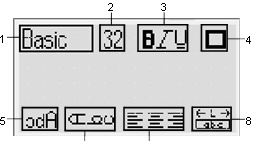
- Font type
- Font size
- Font style
- Borders
- Mirror
- Vertical text
- Alignment
- Label length
To adjust the formatting
- Press
![]() .
. - Use the navigation keys to select the formatting option to change and press
![]() .
. - Select the option to apply to your label and press
![]() .
.
Font Type
Eight font types are available for your labels:
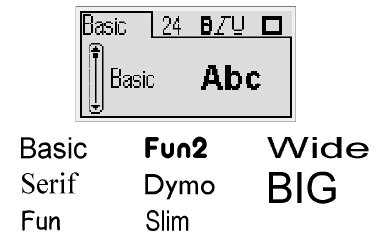
- Use the up and down navigation keys to select the font type.
Font Size
Eight font sizes are available for your labels:
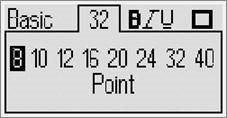
The font sizes available depend on the label width you have selected. The font size applies to all characters on a label.
| Label Width | Font Size Available |
| 1/4" (6 mm) | 8, 10, 12 point |
| 3/8" (9 mm) | 8, 10, 12, 16, 20 point |
| 1/2" (12 mm) | 8, 10, 12, 16, 20, 24 point |
| 3/4" (19 mm) | 8, 10, 12, 16, 20, 24, 32, 40 point |
- Use the left and right navigation keys to select the font size.

 .
.
Font Styles
You can choose from 12 different font styles:
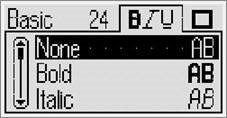
 | Normal |
 | Bold |
 | Italic |
 | Outline |
 | Shadow |
 | Italic + Bold |
 | Normal + Underline |
 | Bold + Underline |
 | Italic + Underline |
 | Outline + Underline |
 | Shadow + Underline |
 | Italic + Bold + Underline |
- Use the up and down navigation keys to select the font style.
When using underline on multi-line labels, each line is underlined.
Adding Borders
You can highlight your text by choosing a border.
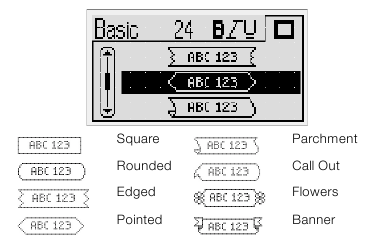
- Use the up and down navigation keys to select the border.
When using borders on multi-line labels, all lines are enclosed in a single border.
Using Mirror Text
The mirror format allows you to print text which reads from right to left, as you would see the text in a mirror.
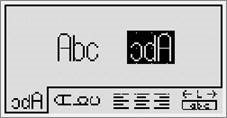
- Use the left and right navigation keys to select the mirror format.
Vertical Text
You can print labels with the text running vertically. Labels with multiple lines of text will print as multiple columns of text.
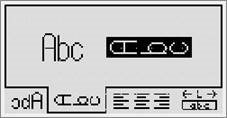
- Use the left and right navigation keys to select the vertical format.

Aligning the Text
You can align the text to print left or right justified on the label. The default alignment is centered.
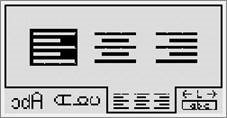
- Use the left and right navigation keys to select the text alignment.
Creating Fixed-Length Labels
Normally, the length of the label is determined by the length of the text. However, you can choose to set the length of the label for a specific application. You can choose a fixed length label up to 15" long.
To set a fixed length
- Use the up and down navigation keys to select the fixed option.
![]()
- Use the up and down navigation keys to select the label length.
![]()
Any text that does not fit within the fixed length appears shaded in the display.
Creating Multi-Line Labels
You can print a maximum of four lines on a label.
The number of lines you can print on a label depends on the label width you have selected.
| Label Width | Maximum Number of Lines |
| 1/4" (6 mm) | 1 line |
| 3/8" (9 mm) | 2 lines |
| 1/2" (12 mm) | 3 lines |
| 3/4" (19 mm) | 4 lines |
To create a multi-line label
- Type the text for the first line and press
![]() .
. - Type the text for each additional line and press
![]() after each line of text.
after each line of text. - Press
![]() to print.
to print.
Using Clip Art, Symbols, and Special Characters
Clip art, symbols, punctuation, and other special characters can be added to your labels.
Adding Clip Art
The label maker includes the clip art shown below.
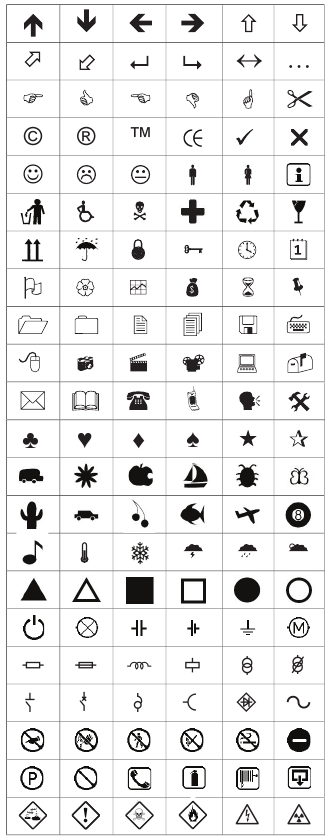
To insert clip art
- Press
![]() , select Clip art, and then press
, select Clip art, and then press ![]() .
. - Use the up and down or left and right navigation keys to select the desired clip art.
- When you locate the clip art, press
![]() to add the clip art to your label.
to add the clip art to your label.
Adding Symbols
The label maker supports the extended symbol set shown below.
| ' | " | , | . | ; | ' |
| : | / | \ | | | & | @ |
| ! | ¡ | ? | ¿ | _ | • |
| ( | ) | { | } | [ | ] |
| € | £ | $ | ¢ | ¥ | # |
| + | - | * | ÷ | √ | ^ |
| ~ | ≈ | = | ≠ | ± | < |
| > | ≤ | ≥ | % | ‰ | ° |
| ₀ | ₁ | ₂ | ₃ | ₄ | ₅ |
| ₆ | ₇ | ₈ | ₉ | ||
| ⁰ | ¹ | ² | ³ | ⁴ | ⁵ |
| ⁶ | ⁷ | ⁸ | ⁹ | ||
| ⅓ | ⅔ | ⅛ | ⅝ | ⅞ | ¼ |
| ½ | ¾ | ⅜ | § | ¶ | |
| α | β | γ | δ | ε | ζ |
| η | θ | ι | κ | λ | μ |
| ν | ξ | ο | π | ρ | σ |
| τ | υ | φ | χ | ψ | ω |
| Α | Β | Γ | Δ | Ε | Ζ |
| Η | Θ | Ι | Κ | Λ | Μ |
| Ν | Ξ | Ο | Π | Ρ | Σ |
| Τ | Υ | Φ | Χ | Ψ | Ω |
| а | б | в | г | д | е |
| ё | ж | з | и | й | К |
| л | м | н | о | п | р |
| с | т | у | ф | х | Ц |
| ч | ш | щ | ъ | ы | Ь |
| э | ю | я | |||
| А | Б | В | Г | Д | Е |
| Ё | Ж | З | И | Й | К |
| Л | М | Н | О | П | Р |
| С | Т | У | Ф | Х | Ц |
| Ч | Ш | Щ | Ъ | Ы | Ь |
| Э | Ю | Я |
To insert a symbol
- Press
![]() , select Symbols, and then press
, select Symbols, and then press ![]()
- Use the up and down or left and right navigation keys to select the desired symbol.
- When you locate the symbol, press
![]() to add the symbol to your label.
to add the symbol to your label.

 .
.
Adding International Characters
The label maker supports the extended Latin character set.
After pressing the Accent key,  , pressing a letter brings up a menu containing all the available variations of that letter.
, pressing a letter brings up a menu containing all the available variations of that letter.
For example, if French is selected as the language and you press the Accent key and then the letter a, you will see a à â æ and so on through all the variations available. The character variations and the order in which the variations appear depend on the language you have selected.
To add accented characters
- Press
![]() .
.
The accented character indicator is shown on the display. - Press an alpha character. The accent variations are displayed.
- Use the left and right navigation keys to select the character you want and press
![]() .
.

Using the Date/Time Stamp
You can insert the current date and time on your label. The date and time format depends on the format you have selected in the label maker settings.
Setting the Date and Time
Before inserting the date and time on your label, you must set the date and time in the label maker settings.
To set the date and time
- Press
![]() , select
, select ![]() , and then press
, and then press ![]() .
. - Select Set date and time, and then press
![]() .
. - Use the navigation keys to set the month, day, and year and then press
![]() .
. - Use the navigation keys to set the hour and minutes, and then press
![]() .
.
Setting the Date and Time Format
You can set the format to use when adding the date and time to your label.
To set the date and time format
- Press
![]() , select
, select ![]() , and then press
, and then press ![]() .
. - Select Date and time format, and then press
![]() .
. - Select the desired date/time format, and then press
![]() .
.
Adding the Date and Time
You can insert the current date and time on your label. Optionally, you can add text before and after the date and time.
To add the date/time stamp
- Press
![]() , select Date/Time, and then press
, select Date/Time, and then press ![]() .
.
The date/time stamp is inserted in the current label.
Using Auto-Numbering
You can print a series of up to 10 labels at a time using auto-numbering.
Adding Auto-Numbering
You can add numeric, uppercase, or lowercase autonumbering to your label. Optionally, you can add text before and after the auto-numbering.
To add auto-numbering
- Press
![]() , select Auto-numbering, and press
, select Auto-numbering, and press ![]() .
. - Select the auto-numbering type to use, and press
![]() .
. - Select the start value for the auto-numbering, and press
![]() .
. - Select the end value for the auto-numbering, and press
![]() .
. - Press
![]() to print the series of labels.
to print the series of labels.
Deleting Auto-Numbering
Auto-numbering is entered on the label as one character.
To delete auto-numbering
- Place the cursor at the end of the auto-numbering text on the display.
- Press
![]() .
.
Using Barcodes
You can use your label maker to print the following types of barcodes:
| EAN 8 | UPC-E |
| EAN 13 | Code 39 |
| UPC-A | Code 128 |
You can only print a barcode on 3/4" (19 mm) wide labels. You can choose whether or not to print the humanreadable text and you can choose to print the humanreadable text either underneath or above the barcode. Optionally, you can add text before and after the barcode.

Adding a Barcode
The barcode text appears on the label in the display just like any other text. However, if the cursor is positioned within the barcode text, the barcode indicator is shown on the display.
To add a barcode
- Press
![]() , select Barcode, and then press
, select Barcode, and then press ![]() .
. - Select the barcode type, and then press
![]() .
. - Enter the text for the barcode within the barcode on the display, and then press
![]() .
. - Select how to print the human-readable text, and then press
![]() .
.
Editing a Barcode
You can edit the text for an existing barcode.
To edit a barcode
- Move the cursor anywhere within the barcode text. The barcode indicator is shown on the display.
- Enter any character. The barcode edit screen is displayed.
- Edit the barcode text and press
![]() .
.
Deleting a Barcode
A barcode is entered on the label as one character.
To delete a barcode
- Place the cursor at the end of the barcode text on the display.
- Press
![]() .
.
Using the Label Maker Memory
The label maker has a powerful memory feature that allows you to save the text of up to nine frequently-used labels. You can recall saved labels and you can insert saved text into a label.
Saving a Label
You can save up to nine frequently-used labels. When you save a label, the text and all formatting are saved.
To save the current label
- Press
![]() .
.
The first available memory location is displayed. - Use the navigation keys to move through the locations. You can store a new label in any of the memory locations.
- Select a memory location and press
![]() .
.
Your label is saved and you are returned to the label.
Opening Saved Labels
You can easily open labels saved in memory to use at a later time.
To open saved labels
- Press
![]() .
.
The first memory location is displayed. - Use the navigation keys to select a label to open and press
![]() .
.
Inserting Saved Text
You can insert the text of a saved label into the current label. Only the saved text is inserted, not the formatting.
To insert saved text
- Position the cursor at the location in the label where you want to insert the text.
- Press
![]() , select Saved Text, and press
, select Saved Text, and press ![]() .
.
The first memory location is displayed. - Use the navigation keys to select the text you want to insert.
- Press
![]() .
.
The text is inserted in the current label.
Caring for Your Label Maker
Your label maker is designed to give you long and troublefree service, while requiring very little maintenance. Clean your label maker from time to time to keep it working properly. Clean the cutter blade each time you replace the label cassette.
To clean the cutter blade
- Remove the label cassette.
- Press and hold the cutter button to expose the cutter blade. See Figure 7.
![Dymo - 420P - To clean the cutter blade To clean the cutter blade]()
- Use a cotton ball and alcohol to clean both sides of the blade.
To clean the print head
- Remove the label cassette.
- Remove the cleaning tool from inside the label compartment cover. If you do not have a cleaning tool, contact DYMO Customer Care (http://support.dymo.com).
- Gently wipe the padded side of the tool across the print head. See Figure 7.
Using Your Label Maker with Your Computer
Your label maker can be used as a standalone label printer or you can print labels from your computer using the built-in software or DYMO Label v.8 software.
Connecting the Label Maker to your Computer
The label maker connects to your computer using the USB connection located on the top of the label maker.
To connect the label maker to your computer
- Plug the USB cable into the USB port on the top of the label maker. See Figure 8.
![Dymo - 420P - To connect the label maker to your computer To connect the label maker to your computer]()
- Plug the other end of the USB cable into an available USB port on your computer.
About the Built-In Software
The built-in software resides on the label maker. You do not need to install additional software or drivers to use the label maker with your computer.
The following figure shows some of the features available in the software.
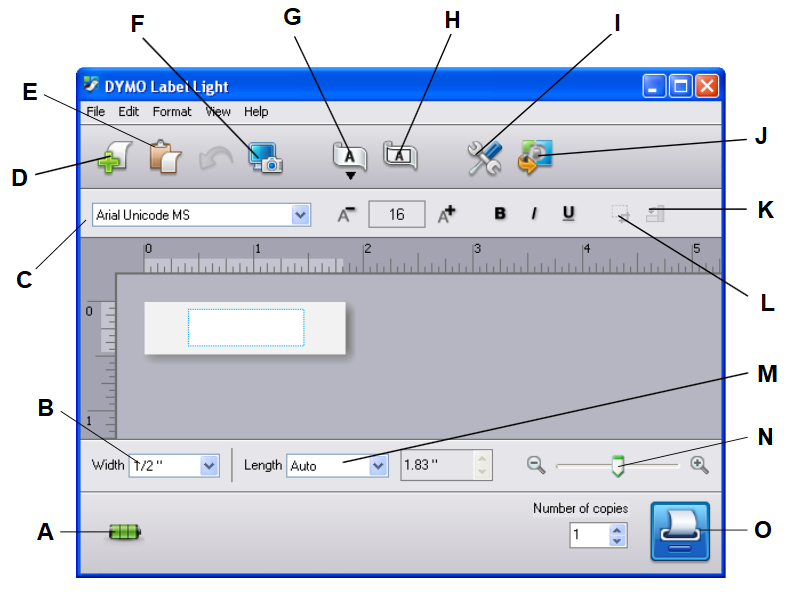
- View the status of the label maker.
- Match the label width to the label cassette in the label maker.
- Format your label as you would in any text editor.
- Create a new label.
- Insert text you've copied to the Clipboard.
- Capture an area of the screen and insert on your label.
- Choose to print a horizontal or vertical label.
- Add a border around the label.
- Change the language settings (Windows only) or units of measure.
- Start advanced DYMO Label v.8 software.
- Rotate images 90 degrees.
- Crop an image added to the label.
- Choose a fixed length for the label or make the label resize automatically to fit the text.
- Zoom the label.
- Print a label.
Refer to the LabelManager 420P Quick Start Guide for information about starting and using the built-in software.
About the DYMO Label™ v.8 Software
To take advantage of more advanced formatting features, download and install DYMO Label™ v.8 software from the DYMO Web site at www.dymo.com.
The following figure shows some of the major features available in DYMO Label v.8.
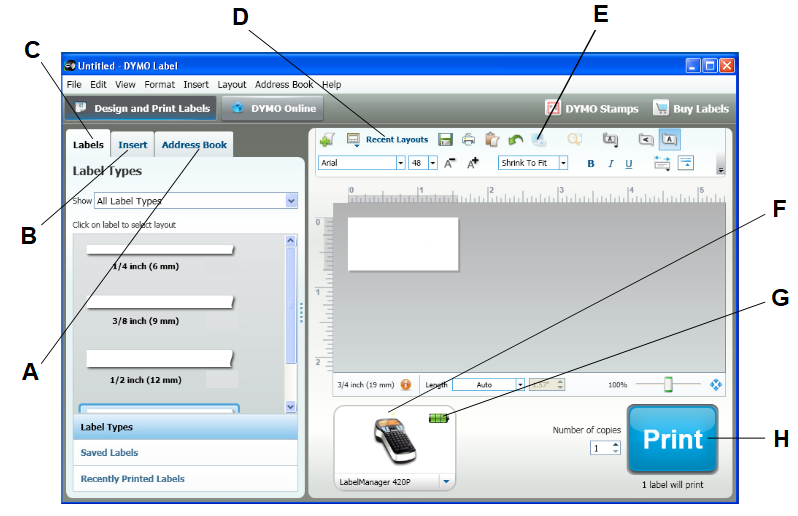
- Store your favorite addresses or other data in the Address Book; automatically insert the data on your label.
- Insert text, addresses, images, shapes, lines, barcodes, dates, and counters.
- Visually choose your label type and apply layouts.
- Apply a layout to a label.
- Capture an area of the screen and insert on your label.
- Select a label maker to print your labels.
- View the status of the label maker.
- Print a label.
For complete details on installing and using the DYMO Label v.8 software, refer to the LabelManager 420P Quick Start Guide and the DYMO Label online Help.
Label Maker Status
The label maker status is displayed in the software window. The following table describes the possible states of the label maker.
 | Label maker is connected and battery is charging |
 | Label maker is connected and battery is not charging |
 | Label maker is not connected or is turned off |
 | Label maker is connected and there is a problem with the battery |
Troubleshooting
Review the following possible solutions if you encounter a problem while using your label maker.
| Problem/Error Message | Solution |
No display |
|
Poor Print Quality |
|
Poor Cutter Performance | Clean the cutter blade. See "Caring for Your Label Maker". |
Printing... | No action required. Message disappears when printing is finished. |
| Too many characters Exceeded maximum number of characters in buffer. | Delete some or all of the buffer text. |
Too many lines Exceeded maximum number of lines. |
|
| Barcode not allowed Barcodes can only be printed on 3/4" wide labels. |
|
Charge Battery! Battery pack almost discharged | Attach the charging adapter to the label maker to recharge the battery pack. See "Recharging the Battery". |
| Battery too low! Battery pack not inserted properly or damaged. |
|
Wait - Battery Charging | Allow the battery pack to recharge before unplugging the label maker. |
| Tape Jam Motor is stalled due to label jam. |
|
If you still need assistance, visit the DYMO Web site at www.dymo.com.
Documentation Feedback
We are constantly working to produce the highest quality documentation for our products. We welcome your feedback.
Send us your comments or suggestions about our user guides. Please include the following information with your feedback:
- Product name, model number, and User Guide page number
- Brief description of instructions that are inaccurate or unclear, areas where more detail is needed, and so on
We also welcome your suggestions about additional topics you would like to see covered in the documentation. Send email messages to: documentation@dymo.com
Please keep in mind that this email address is only for documentation feedback. If you have a technical question, please contact Customer Support.
Environmental Information
The equipment that you have bought requires the extraction and use of natural resources for its production. It may contain substances that are hazardous to health and the environment.
In order to avoid the dissemination of those substances in our environment, and to diminish the pressure on natural resources, we encourage you to use the appropriate takeback systems. These systems will reuse or recycle most of the materials of your end-of-life equipment in an environmentally sound way.
The crossed-bin symbol marked on your device indicates you should use these systems.

If you need more information on the collection, reuse, and recycling of this product, please contact your local or regional waste administration.
You can also contact DYMO for more information on the environmental performance of our products.
Copyright
© 2015 Newell Rubbermaid Europe, LLC. All rights reserved. Rev. 3/18
No part of this document may be reproduced or transmitted in any form or by any means or translated into another language without the prior written consent of Newell Rubbermaid Europe, LLC.
Trademarks
DYMO, DYMO Label, and LabelManager are registered marks in the US and other countries. All other trademarks are the property of their respective holders.
FCC Statement
The user is cautioned that changes or modifications not expressly approved by the party responsible for compliance could void the user's authority to operate the equipment.
Note: This equipment has been tested and found to comply with the limits for a Class B digital device, pursuant to part 15 of the FCC Rules. These limits are designed to provide reasonable protection against harmful interference in a residential installation. This equipment generates, uses and can radiate radio frequency energy and, if not installed and used in accordance with the instructions, may cause harmful interference to radio communications. However, there is no guarantee that interference will not occur in a particular installation. If this equipment does cause harmful interference to radio or television reception, which can be determined by turning the equipment off and on, the user is encouraged to try to correct the interference by one or more of the following measures:
- Reorient or relocate the receiving antenna.
- Increase the separation between the equipment and receiver.
- Connect the equipment into an outlet on a circuit different from that to which the receiver is connected.
- Consult the dealer or an experienced radio/TV technician for help.

Documents / ResourcesDownload manual
Here you can download full pdf version of manual, it may contain additional safety instructions, warranty information, FCC rules, etc.
Advertisement
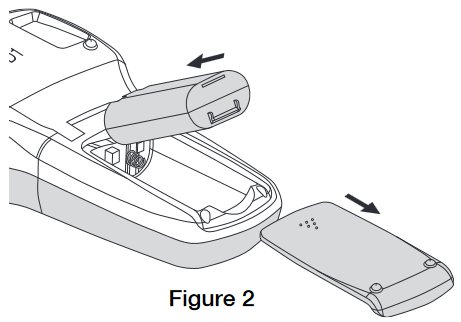
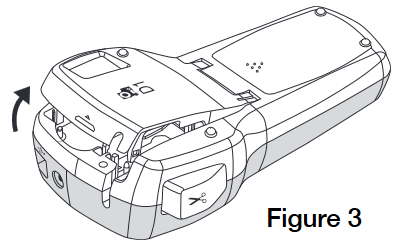
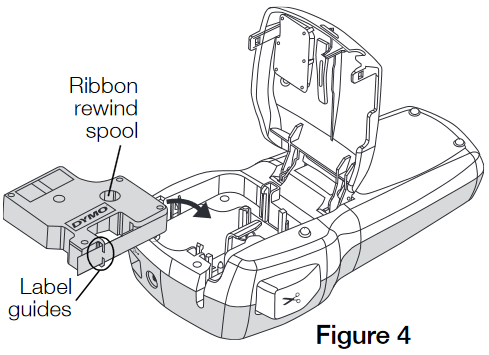
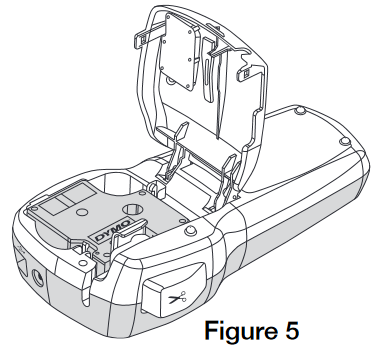
 .
.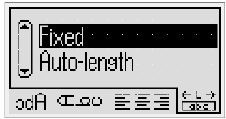
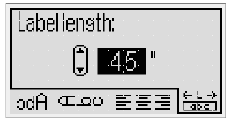
 .
. to print.
to print. , and then press
, and then press  .
. .
. .
.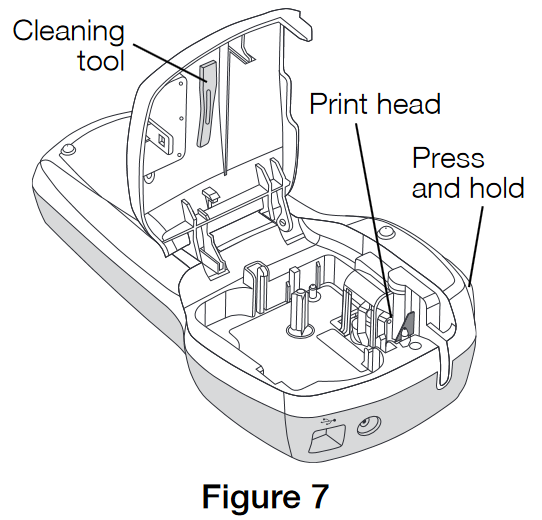
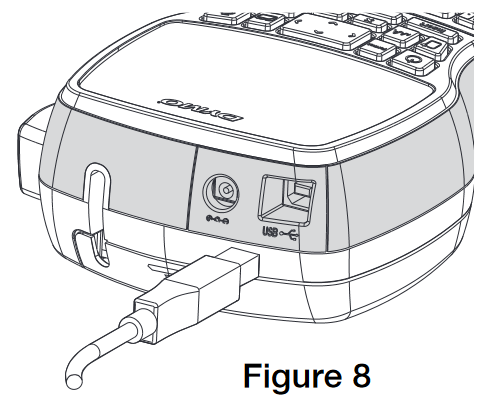





















Need help?
Do you have a question about the 420P and is the answer not in the manual?
Questions and answers